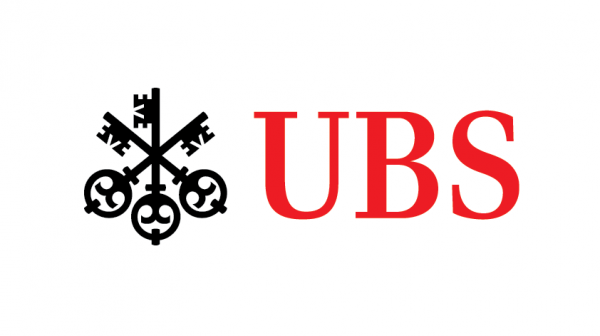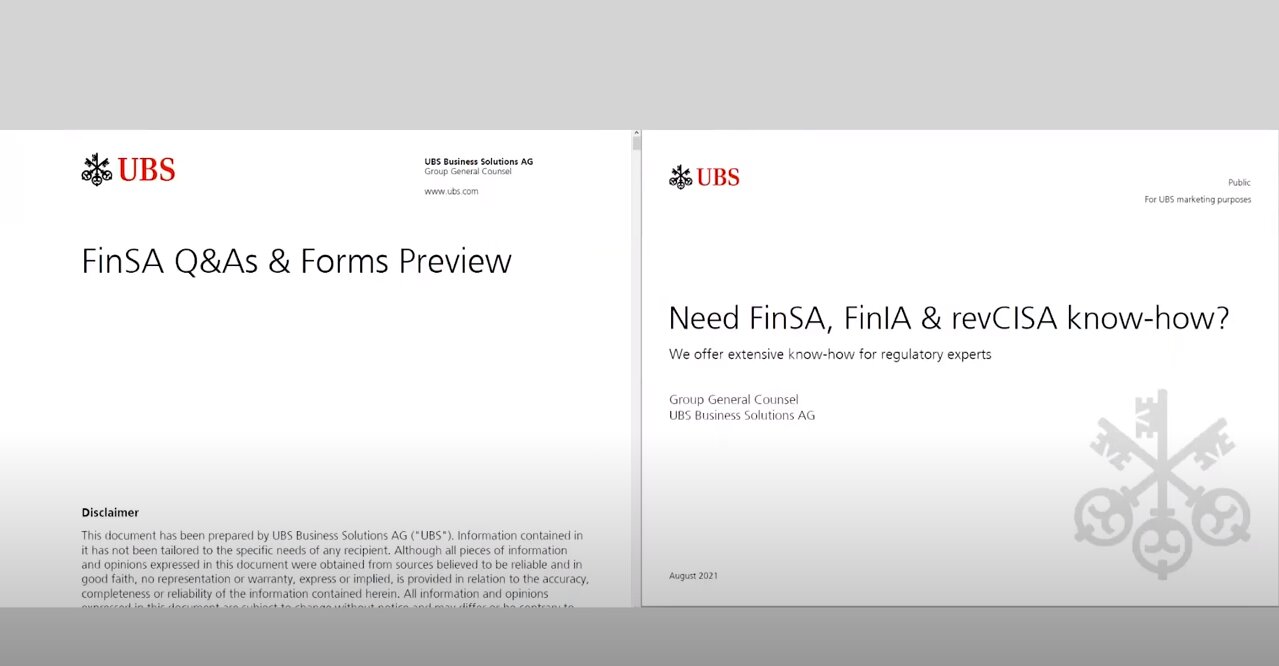Author's Note
The product, a know-how collection entitled “ FinSA Q&A: Code of Conduct Rules CISA vs. FinSA ” consists of 3 questions and answers (" Q&As ") developed by the UBS team of regulatory experts and provides you with the basis for understanding the interplay between the code of conduct rules of the CISA and the FinSA. Your purchase gives you access to a know-how collection prepared by UBS and may serve as a basis for you to establish your best practices as a financial service provider. Code of Conduct Rules CISA vs. FinSA When applying the FinSA in its interplay with the Swiss Financial Institutions Act (“ FinIA ”) and the revised Collective Investment Schemes Act (“ revCISA ”), financial service providers also have to understand the interplay between the code of conduct rules of the CISA and the FinSA. The rules in their interplay can be complex and the practice is still developing. A good understanding of this topic may hence be one of the top priorities in order to avoid...
Read moreThe product, a know-how collection entitled “FinSA Q&A: Code of Conduct Rules CISA vs. FinSA” consists of 3 questions and answers ("Q&As") developed by the UBS team of regulatory experts and provides you with the basis for understanding the interplay between the code of conduct rules of the CISA and the FinSA.
Your purchase gives you access to a know-how collection prepared by UBS and may serve as a basis for you to establish your best practices as a financial service provider.
Code of Conduct Rules CISA vs. FinSA
When applying the FinSA in its interplay with the Swiss Financial Institutions Act (“FinIA”) and the revised Collective Investment Schemes Act (“revCISA”), financial service providers also have to understand the interplay between the code of conduct rules of the CISA and the FinSA. The rules in their interplay can be complex and the practice is still developing. A good understanding of this topic may hence be one of the top priorities in order to avoid regulatory and operational risks in this context.
These Q&As are essential practical knowledge for those that provide financial services and/or offer collective investment schemes in Switzerland or to clients in Switzerland.
For a full overview of the questions covered by this product, see Questions answered by UBS' FinSA Q&A under the revCISA and other amended laws section.
What you get
After you make your purchase, PartnerVine makes the Q&A available to you for download as a searchable pdf. Below are two Q&As from this product so you can see a sample of what you will get:
Samples of the Q&A
What is the difference between the code of conduct rules under the FinSA and the revCISA?
FinSA:
The code of conduct rules at point of sale are now exclusively governed by the FinSA and apply to all financial service providers. The code of conduct rules under the FinSA consist of information duties (art. 8 FinSA et seqq.), the obligation to provide appropriate and suitable financial services (art. 10 et seqq. FinSA), documentation and accountability duties (art. 15 et seq. FinSA) and transparency and care in client orders (art. 17 et seqq. FinSA).
For more detailed information please refer to the topics Scope, Information Duties & Communication, Investor Profile, Appropriateness & Suitability and Client Orders.
RevCISA:
In contrast to the FinSA’s code of conduct rules, which primarily aim at protecting the clients when acquiring financial instruments and which must be observed at the point of sale, the obligations under the revCISA aim at safeguarding the investors’ interests through careful asset management in the interest of the collective investment schemes. Hence, those code of conduct rules relate to collective investment schemes as a product. The code of conduct rules still consist of fiduciary, due diligence and information duties (cf. art. 20(1) revCISA).
Please note, that the code of conduct rules under the FinSA and the revCISA may apply at the same time, because they serve different purposes.
To which financial institutions do the code of conduct rules under art. 20 et seq. revCISA apply?
The code of conduct rules apply to the financial institutions listed in art. 13(2) revCISA:
- Société d’investissement à capital variable (SICAV);
- Limited partnership for collective investment;
- Société d’investissement à capital fixe (SICAF);
- Custodian bank;
- Swiss representative of foreign collective investment schemes.
However, they also apply to the financial institutions which are newly regulated by the FinIA:
- Fund management companies (art. 32 et seqq. FinIA);
- Asset managers of collective investment schemes, which are now newly defined as managers of collective assets (art. 24 et seqq. FinIA).
Please note that fund institutions that exclusively manage their own funds, do not qualify as financial service provider and therefore must only adhere to the code of conduct rules set forth in art. 20 et seq. revCISA.
Who needs it
The FinSA Q&A: Code of Conduct Rules CISA vs. FinSA is for financial service providers providing their services and/or offering collective investment schemes in Switzerland or to clients in Switzerland. If you are a financial service provider or a provider of collective investment schemes, this product helps you understand the difference between the code of conduct rules under the CISA and the FinSA and implement the rules accordingly.
About UBS
UBS Business Solutions AG ("UBS") is a wholly-owned subsidiary of the UBS Group AG. For more information on UBS, go to www.ubs.com.
Key features
Key features of this product include:
- Structured & easy-to-read. Structured in a reader-friendly, easy-to-access Q&A format that is aligned with the relevant regulations.
- Easy-to-understand. The language is practical and business friendly. The explanations in the text are accompanied by tables and graphics which make it easier to understand and communicate the regulations.
- Interconnected. The Q&As include references to related content in other modules of UBS' FinSA Q&A and third party content to help readers understand the issues.
- Categorization. All of the Q&As are categorized into specific topic groups which you can adapt to your individual needs.
- Upskilling your employees. Underlined terms are explained in the Glossary, which is a complementary product that comprises over 160 terms and definitions. Together with the Glossary, the Q&As provide knowledge management support not just for employees that know an issue well, but employees that need to learn about an issue, increasing expertise across your firm.
- Cost & time savings. You receive extraordinary value when you purchase this product. As your usage increases, your savings increase dramatically (see the Relative Advantage Calculator on the left hand side and the section below on the Relative Advantage Calculator, which will help you understand the value of this product).
Relative Advantage
The FinSA Q&A: Code of Conduct Rules CISA vs. FinSA gets rid of the need to research Swiss regulatory requirements regarding the interplay between the code of conduct rules of the CISA and the FinSA. The Relative Advantage Calculator on this page shows a conservative use case, and the amount you would save compared to doing the tasks without the benefit of our product. For the calculator, we've taken an hour as the estimate for a lawyer charging CHF 450 per hour to research the answer to one of our Q&As. Our assumptions are conservative ones based on our experience. If you'd like to change our assumptions, you can do so in the calculator and run the number again. The value delivered by our product is meaningful in the vast majority of circumstances, and exceptional as your usage increases.
Circumstances of Use
This product is intended for Swiss financial service providers and financial institutions and provides general information on the FinSA and related laws as of the date of finalization. Our objective is to provide the UBS' perspective of the law in order to help support a better understanding of the new regulatory framework in Switzerland. This product can be used either for implementing the new regulatory framework or as the basis of your own internal knowledge management. This product is not for use outside of Switzerland.
Important Terms
- This product is provided to you only for use in Switzerland.
- You are required to pay for this product by invoice after you have received it. As digital products are so easily replicable, there is no right of rescission for this product and your obligation to pay is unconditional.
- This product is provided to you on a non-reliance basis. There is no guarantee that this product will address your particular facts and circumstances, and you will have no recourse to UBS or PartnerVine if you do not think it does.
- Use of this product does not create an attorney-client relationship with UBS Business Solutions AG or PartnerVine, nor should the product be considered a substitute for qualified legal advice. If you need advice tailored to your facts and circumstances, please consult qualified counsel.
- Your contract for this product is with UBS Business Solutions AG. You will not have recourse to PartnerVine in respect of your use and enjoyment of this product.
Support
This product is a downloadable pdf. There is no additional support for this product.




